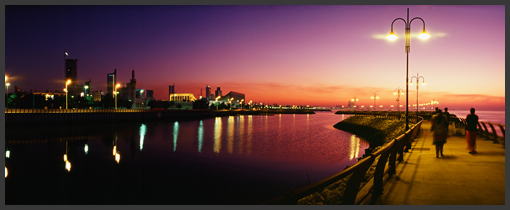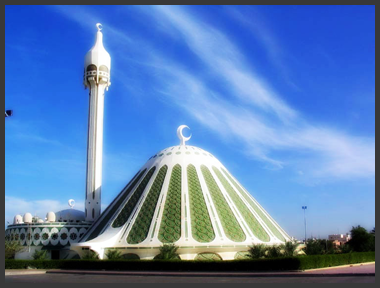Kuwait Travel and Tourism
The name Kuwait derives from Akwat, which means fortress near water. For the gulf countries it has never been easy to lure tourists away from the aforementioned pearls of the orient. Egypt has the pyramids, Jordan its ancient Roman Amphitheaters and Syria its capital Damascus the world’s oldest, permanently inhabited city.
Culture, tourism and leisure: not built on sand, but near water
“Hyiakam Allah”, God greets you, says the welcoming sign in the arrival zone at Kuwait International Airport. “We are an open country and foreigners are always welcome”, says Minister of Commerce and Industry Ahmad Al-Haroun. In fact the airport is a melting pot of nearly all nations, ethnicities, and religions.
Arab men and women from all over the gulf region wearing the traditional white Kandhoura rub shoulders with Western tourists in jeans and polo shirts. Arab women wearing the black Abaya mingle with their counterparts from Europe in the duty-free perfumery. Even nuns are seen in the crowd. They are mostly working for the numerous churches in the country.
Lifestyle and leisure
The name Kuwait derives from Akwat, which means fortress near water. For the gulf countries it has never been easy to lure tourists away from the aforementioned pearls of the orient. Egypt has the pyramids, Jordan its ancient Roman Amphitheaters and Syria its capital Damascus the world’s oldest, permanently inhabited city.
Nevertheless Kuwait, with dozens of top brand hotels, has no reason to be embarrassed about the tourist attractions of other Gulf countries such as Dubai’s Palm islands or the Pearl Qatar (another artificial island in the gulf). Kuwaitis are welcoming and generous people. Hence, it is a secret tip for your next holiday.
Ahmad Al-Haroun sums up what’s so special about a holiday in his country: “We have many high-end-malls, where you find anything your heart desires, from brand names to luxury restaurants. In addition, all international hotels are available here. We have all kind of entertainment and sports facilities (Tennis courts, golf courses) and some of the best sea resorts in the region. All of this and a great deal of freedom as long as it will not contradict our cultural tradition and heritage.” 
Wearing sport shorts or drinking alcohol in public, for example, is against the religion of Islam, but doing sports in dedicated areas or meeting in a hotel bar is certainly allowed.
Those who want to learn more about the state’s history will not want to miss the Kuwait National Museum. Opened in 1986, it was completely destroyed in 1990 during the Iraqi invasion and eventually rebuilt and renovated in the years after Kuwait was liberated on February 26. 1991.
The museum exhibits archaeological pieces as well as paintings that show how the people in ancient times lived, dealt with each other, and how they reigned.
Tourists can learn about the pillars of Islam by visiting the Grand Mosque, which has special opening times for Non-Muslims led by a guide. The dome of the mosque is 26 meters in diameter.
It is 43 meters high. Decorated with eye-catching calligraphy, the Arabic nouns are the “Asma al-hosna“, the 99 names of God. The mosque can accommodate up to 10,000 men in the main prayer hall, and up to 950 women in the separate hall for women. A visit to the Emir’s residence, the Bayan palace is unfortunately not possible due to security reasons.
With luxury hotels, such the Swiss Mövenpick group, Sheraton, the German Kempinski brand, Marriott or Radisson SAS, Kuwait is the perfect destination for leisure, lifestyle, and the ideal mix of modern Arabia.… The Marriott Courtyard, which is located nearby the well-known investment bank, Global Investment House, in Kuwait City, is one of the sweetest places visitors stay.
Its lighted atrium architecture creates a lovely atmosphere and motivates visitors to spend hours in the open hotel lobby. The roof-top pool and the adjacent gym are most amazing and provide a major reason to choose the Marriott Courtyard.

The capital’s fabulous corniche (seaside esplanade) is most adorable from the top of the iconic water towers; it is the highlight of the country. The three Kuwait Towers (Arab.: Abraaj al-Kuwait) invite visitors to view the capital from a 145.80m high observation platform.
A guided trip to the desert life and a visit ta a Beduin village is a must on the travel agenda. For water aficionados, diving in the Persian Gulf, one of Jazeera Airways CEO Stefan Pichler ’s hobbies, is obligatory as well. The country’s nine islands are not inhabited with the exception of the Failaka island.